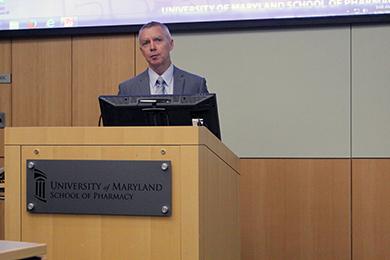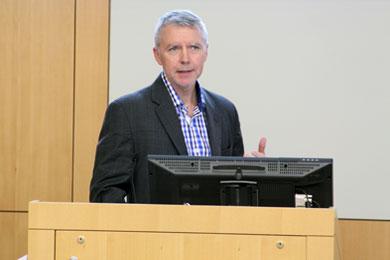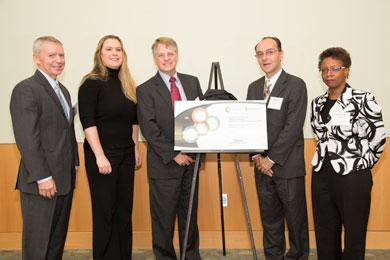Biological Mass Spectrometry Expert Joins PSC Faculty
David Goodlett, PhD, former professor and director of the Mass Spectrometry Center at the University of Washington School of Pharmacy, announced as department’s Isaac E. Emerson Chair of Pharmaceutical Sciences.
By Malissa Carroll
September 17, 2013
The Department of Pharmaceutical Sciences (PSC) at the University of Maryland School of Pharmacy has welcomed David Goodlett, PhD, as its newest faculty member. Goodlett joined the department as a full professor, the Isaac E. Emerson Chair of Pharmaceutical Sciences, and director of the Mass Spectrometry Facility following his tenure as professor and director of the Mass Spectrometry Center at the University of Washington in Seattle.
“We are very pleased to welcome Dr. Goodlett to the School of Pharmacy,” says Andrew Coop, PhD, professor and chair of PSC. “With a research career that spans academia, government, and the private sector, Dr. Goodlett brings a diverse skillset to our department that will benefit both our faculty and students. We are confident that, as previous director of both the Mass Spectrometry Center at the University of Washington and several mass spectrometry cores within the National Institutes of Health, Dr. Goodlett possesses the knowledge and skills necessary to further advance the work of the Mass Spectrometry Facility at the School of Pharmacy. We are fortunate to have him as a member of our faculty.”
Goodlett received his Bachelor and Master of Science degrees in chemistry from Auburn University. He completed his doctorate at North Carolina State University, where his research focused on mass spectrometry and protein structure, as well as a post-doctoral fellowship at Battelle Memorial Institute that focused on a field now known as Native mass spectrometry.
As the new Isaac E. Emerson Chair of Pharmaceutical Sciences, a chair endowed to the School in 1927 by Captain Isaac Emerson, president of the Emerson Drug Company, Goodlett’s research program will concentrate on developing mass spectrometric methods that are applied to solve problems in prostate cancer, respiratory biology, Gram-negative bacteria, and leukemia.
“My research seeks to examine the mysteries surrounding structure-function relationships in proteins and lipids,” says Goodlett. “I use mass spectrometry to pursue this interest, which has led me to be involved with the investigation of early protein markers of lung diseases and leukemia, as well as the use of chemical cross-linking to discover juxtaposed faces of interacting proteins.”
The Mass Spectrometry Facility at the School of Pharmacy, which Goodlett now directs, offers researchers from the School and surrounding research community the opportunity to perform a wide range of sophisticated experiments. It provides state-of-the-art expertise, methodology, and instrumentation to researchers and collaborates with faculty, staff, and students on a variety of research projects. The experience of the facility’s staff spans a broad range of topics, including chemical and pharmaceutical biology, infectious and metabolic disease, translational and regulatory sciences, and bioinformatics and technology development.
“Before joining the faculty at the School of Pharmacy, I began to collaborate with Dr. Maureen Kane, an assistant professor in PSC, through another colleague who studied retinoic acid biology and was very familiar with the Mass Spectrometry Facility and its capabilities,” says Goodlett. “I believe this facility has the potential to become an invaluable tool for researchers from a number of different fields. I am excited to have the opportunity to lead this facility and undertake a wide range of new initiatives that I am confident will help it continue to expand and evolve in the coming years.”
At the School of Pharmacy, Goodlett will continue his long-standing collaboration with Robert Ernst, PhD, associate professor in the Department of Microbial Pathogenesis at the University of Maryland School of Dentistry, to develop a mass spectrometry library that will offer health care providers a new way to identify bacteria. His lab will also study top-down proteomics and use mass spectrometry to examine the sequences of large proteins.
“In the past, mass spectrometers have not been able to sequence whole proteins because of their size, so we needed to cut the protein into smaller pieces to allow the technology to analyze the sequences,” says Goodlett. “Now, technology has advanced to offer us the opportunity to sequence whole proteins directly. This sequencing of proteins to better understand the differences that relate to genetic variations and how that affects an individual’s ability to metabolize different drugs will be an important focus of my laboratory at the School of Pharmacy.”
Goodlett also brings to Baltimore the company he and Ernst co-founded. Deurion, LLC, is a privately held company with expertise in biological mass spectrometry, bioinformatics, and microfluidics. It is most recently credited with the development of surface acoustic wave nebulization (SAWN) technology. He will also continue to serve as a visiting professor at the University of Edinburgh in Scotland, as well as a Finland Distinguished Professor at the University of Turku.



